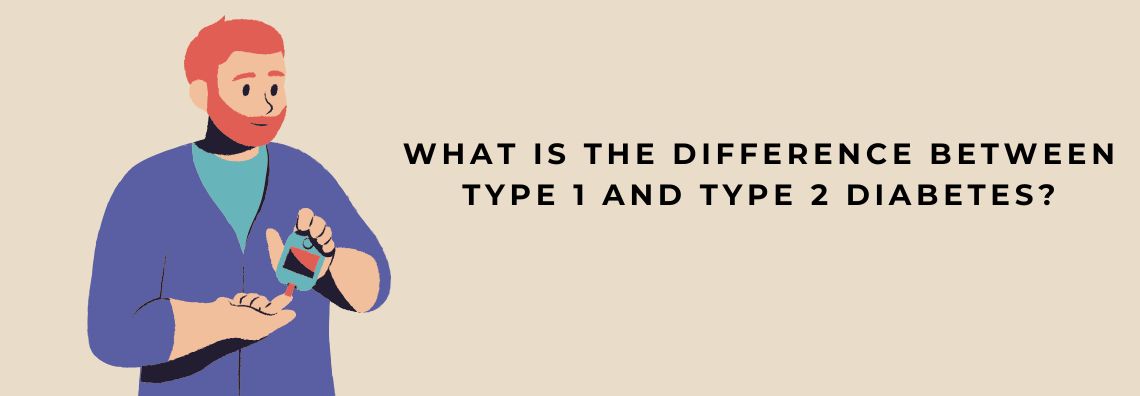
We all know diabetes but do we know “diabetes”? Understand the difference between type 1 and type 2 diabetes in this guide. We will compare the symptoms, treatments and risk factors of both.
Type 1 and type 2, both types of diabetes are considered serious conditions. Both can occur when your body does not store and use glucose properly. Some things need to be clear about these. Let us check it out.
Type 1 Diabetes
In type 1 diabetes, the body’s immune system attacks the pancreas. It prevents the pancreas from producing insulin. This is an autoimmune condition. Although type 1 diabetes can start at any age, it usually develops in childhood and adolescence.
Symptoms of Type 1 Diabetes
Symptoms of type 1 diabetes develop quickly. It often depends on how your blood sugar. Take a look at some of the symptoms of type 1 diabetes:
- Increased thirst and urination
- Unexpected weight loss
- Numbness in hands or feet
- Dry skin
- Increased number of infections
- Tired feeling
- Slow healing
Treatments For Type 1 Diabetes
Here are multiple treatment options available for type 1 diabetes. Some of them are as follows:
- Insulin Therapy
This therapy becomes necessary for the treatment of type 1 diabetes because the body can’t produce enough insulin on its own. This treatment can involve multiple daily injections, an insulin pump and a closed-loop system.
In multiple daily injections, different types of insulin will be injected multiple times a day. In an insulin pump, a small device will pimp insulin into the bloodstream. Closed-loop system combines a continuous glucose monitor with an insulin pump. This helps deliver insulin automatically.
- Lifestyle Changes
Regular exercise and diet are important for diabetic people. Stress management is also necessary. You can perform Yoga or meditation to relax your mind and body. Regular exercise helps enhance insulin and makes it easier to manage blood sugar levels.
A specialist will help you to bring changes. General Surgeon Brisbane is there for you to lead a healthy lifestyle.
- Blood Glucose Monitoring
Healthcare providers will examine your blood sugar levels. They will perform blood glucose monitoring to keep a keen eye on your progress and adjust the dose of insulin accordingly.
Regular monitoring allows for the prevention of further complications and upcoming risks. You must not avoid the follow-up appointments and the tips your professionals give.
Risk Factors of Type 1 Diabetes
Understand the risk factors of type 1 diabetes here:
- Family history plays an important role in developing type 1 diabetes. If you have parents or siblings with type 1 diabetes then your risk of developing it increases.
- Although type 1 diabetes can occur at any age, most often it develops in children, teens or young adults.
- Genetics can also lead to conditions like type 1 diabetes.
- Some environmental factors also invite type 1 diabetes like rapid weight gain at early age, pregnancy and some infections.
Type 2 Diabetes
The body’s cells become resistant to insulin or the pancreas produces less insulin than they should in type 2 diabetes. This is not an autoimmune condition. People over 40 are more likely to have type 2 diabetes.
Symptoms Of Type 2 Diabetes
Here is a list of symptoms that can be noticed for the type 2 diabetes:
- Fatigue
- Blurred vision
- Slow healing process
- Dry skin
- Increased thirst and urination, especially at night
- Increased hunger
Treatment Options For Type 2 Diabetes
Here take a look at some of the treatment options for type 2 diabetes:
- Lifestyle changes are a must to make. You need to focus on a healthy diet, regular exercise and losing weight. If you succeed in losing 5-10% of your body weight then this will help lower your risk of cardiovascular disease.
- Your healthcare professional will advise medications based on the blood glucose levels of your body. Follow your healthcare professional’s advice and move ahead wisely.
- Insulin dose may be prescribed in addition to other medications.
There can be more treatment options so ask a professional for better advice and options.
Risk Factors Involved In Type 2 Diabetes
Take a look at some of the risk factors of type 2 diabetes:
- Obesity is counted as one of the common reasons behind type 2 diabetes.
- Hypertension or high blood pressure can increase the risk of type 2 diabetes.
- Family history like a parent or sibling with type 2 diabetes increases the risk of having it.
- High cholesterol can increase the risk of having type 2 diabetes.
- Too much alcohol consumption can also be counted as one of the risk factors.
- Certain medical conditions can increase the risk of having type 2 diabetes such as cardiovascular disease, hyperuricemia and metabolic syndrome.
General surgeon Brisbane can help you and suggest the best treatments for your type of diabetes.